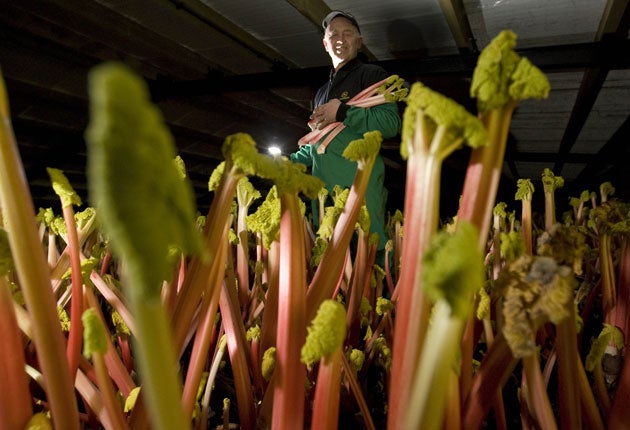All they can say in Wakefield is 'rhubarb, rhubarb, rhubarb'
A Slice of Britain: Yorkshire's pink vegetable takes its place on the world stage – just in time for its festival

It is easy to spot the rhubarb heads, as the pointy pink batons jut out of their bags. These are the Wakefield faithful: men and women to whom Geoffrey Boycott-style gags about his mother's ability to hold off limp bowling with a stick of rhubarb fall on deaf ears. And they are in town today to worship at the temple of this peculiar pink vegetable, (not a fruit, because it doesn't contain seeds) which is enjoying a double celebration after joining the hallowed ranks of Europe's protected foods just in time for its own annual festival.
Neil Hulme, who runs one of Yorkshire's biggest rhubarb farms, E Oldroyd & Sons, admits the timing of the European Commission's decision to elevate rhubarb to the status of Champagne or Parma ham was a fluke. "We were expecting the news early March," he says, pausing to light a candle. He is in one of his own rhubarb sheds, the tiny flame illuminating a peculiar congregation of tightly bunched, rose-coloured sticks, their scrunched green tops like a frizzy head of hair on a leggy model.
These are the famous forced rhubarb sheds of the so-called pink triangle, a nine-square-mile area between Wakefield, Morley and Rothwell that is home to Yorkshire forced rhubarb, a bittersweet delicacy that marks the start of a new food year for home cooks and chefs alike.
Mr Hulme is getting ready to show some 80 people around the sheds, just as soon as his wife Janet Oldroyd-Hulme has finished her talk. The Oldroyd farm is a magnet for rhubarb fans and runs visits throughout the short forced growing season, which lasts only from January to March.
Carlton Boyce, a local dad of three, booked his family's trip six weeks ago. "They're so popular it was already nearly full," he says. He was drawn by the prospect of seeing it "growing by candlelight. And that it grows so quickly you can hear it."
He is only half correct. Although candles are lit at harvest time – and for visitors – for the rest of the crop's brief life, the sheds are kept in total darkness to force the rhubarb to grow quickly in the indoor warmth. It is the lack of sunlight that encourages the delicate pink stems to push through, the sweetness coming from the carbohydrate stored in the roots. The soft "pops" that you hear are the rhubarb buds bursting: "Like a chick hatching from an egg," as Mr Hulme describes it.
Once the coachloads of visitors are done with the farm visit, it is onwards to the Wakefield Centre, the home of the festival proper. Over the course of the event, which kicked off on Wednesday with the local author Richard Bell's "Rhubarb Triangle Walk", organiser Hazel Birdsall expects around 100,000 people to pass through, despite foul weather conditions that forced the postponement of the "Rhubarb Run", an annual race for primary school children.
Luckily, the rain has eased briefly yesterday morning, and the shoppers are out in force for the accompanying market stalls. As well as buying plenty of the vegetable itself, rhubarb fans can scoop up chutneys, pies, cheeses and cakes. Jayne Gordon, at the Bedazzled Cupcakes stand, says her new rhubarb cupcake, which she devised specially for the festival, is selling particularly well. "Well, in Wakefield at least. We were at a farmers' market in Sheffield last week and we didn't sell one," she admits.
The rhubarb cheese at local cheesemonger Cryer & Stott's stall is also popular. Clare Holmes is struggling to keep up with demand for Ruby Gold, a ewes' milk cheese sandwiched with a rhubarb purée. "One lady came up specially from London to buy some," she says. It's all a far cry from the reaction when she and her husband came up with the cheese a decade ago. "We wanted to do something specific to the area, but initially we were laughed out of town. We thought it would just be a novelty, but it's really popular."
After decades in the culinary wilderness, rhubarb is again soaring in popularity. Sales at Morrisons are up by 20 per cent in the past few weeks, and both Asda and M&S are taking 50 per cent more from the Oldroyds than they did last year. Now, with that EC-protected designation of origin guarantee, which means it has been produced, processed and prepared within a certain geographical area, forced rhubarb acolytes can be sure of what they are getting. A pink veg from Yorkshire.
Join our commenting forum
Join thought-provoking conversations, follow other Independent readers and see their replies
Comments
Bookmark popover
Removed from bookmarks